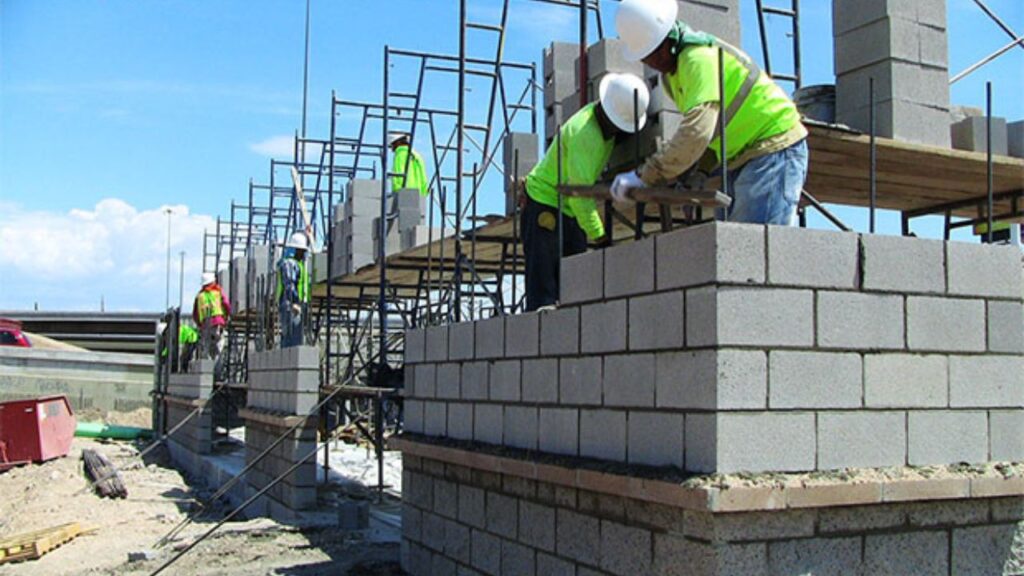- Homepage
- Construction In St. Pete Beach
- Cost Estimator In St. Pete Beach
Electrical Cost Estimator in St. Pete Beach, FL
Leading provider of electrical estimating.
A cost-per-square-foot metric provides a quick reference point for estimations, helping stakeholders understand ballpark figures before diving into detailed calculations. In St. Pete Beach, baseline electrical costs commonly fall between $4 and $12 per square foot, with luxury or specialized projects commanding higher rates due to upgraded materials, complex wiring schemes, and advanced technologies.
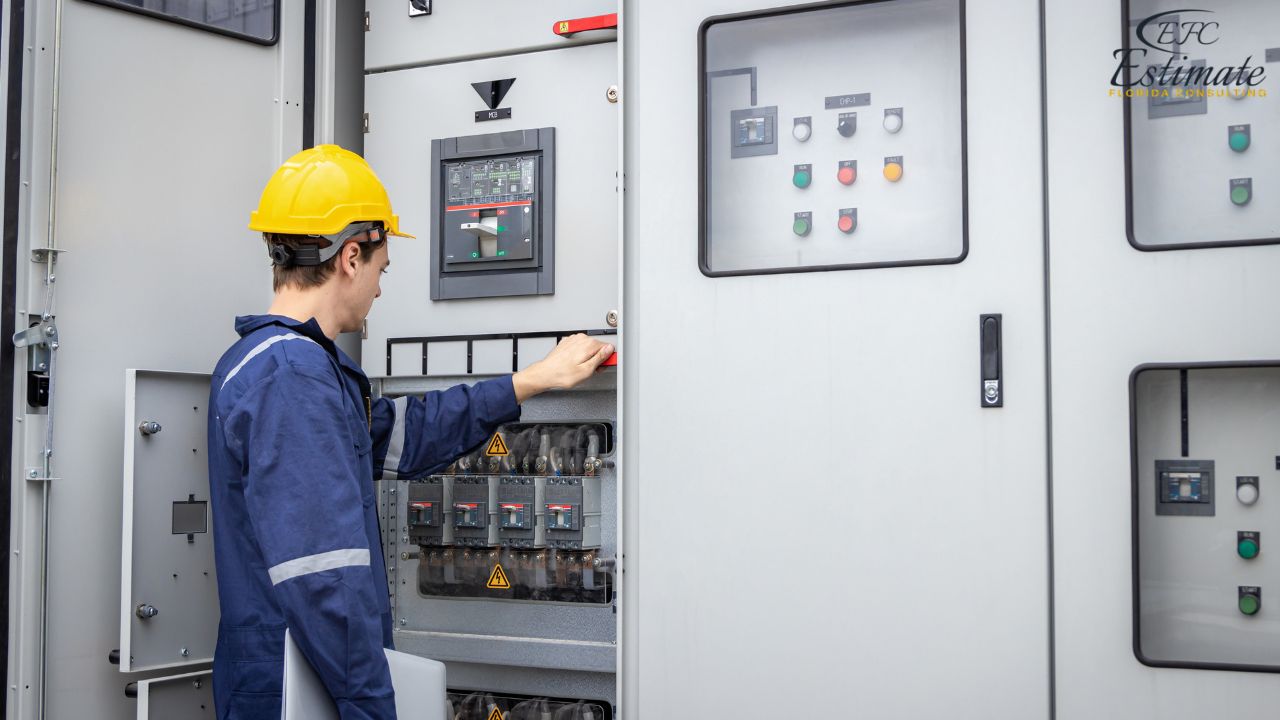
We Work for All Construction Trades
Construction trades encompass a variety of specialized roles, each critical to the successful completion of a project. Skilled tradespeople not only ensure the work is done right but also enhance safety, efficiency, and compliance with local building codes. From the initial groundwork to the final touches, every step requires expertise from dedicated professionals.
Average Electrical Costs in St. Pete Beach
Project Type | Average Cost Range |
Basic Home Rewiring | $3,000 – $8,000 |
New Home Build | $10,000 – $30,000 |
Commercial Build-Out | $20,000 – $100,000+ |
Multi-Family Units | $20,000 – $150,000+ |
Lighting Upgrades | $2,000 – $10,000+ |
Electrical Cost by Project Type
Residential Electrical Installations
Residential electrical projects focus on creating safe, efficient, and user-friendly systems to power everyday appliances, lighting, and devices. The costs for basic installations typically range from $4 to $8 per square foot, varying with the home’s size, layout, and wiring complexity. A standard installation might include basic outlets, light fixtures, and breaker panels. However, larger or more customized homes often feature additional elements like recessed lighting, outdoor electrical setups, or advanced security systems, which can push costs higher. Luxury residences with integrated smart home systems—such as automated lighting, energy monitoring, or voice-activated controls—can significantly increase expenses due to the advanced technology and skilled labor required.
Commercial Electrical Installations
Commercial buildings, such as offices, retail spaces, and restaurants, require electrical systems tailored to specific business needs. These systems often include features like high-capacity circuits for heavy equipment, emergency lighting, and advanced security and surveillance setups. Costs generally range from $6 to $12 per square foot, influenced by building size, electrical load requirements, and local code compliance. In St. Pete Beach, for example, commercial installations frequently involve additional considerations such as compliance with hurricane safety standards and energy-efficient systems. Many businesses also invest in automation technologies, such as programmable lighting or climate control systems, which enhance operational efficiency but add to the initial cost.
Industrial and Specialty Projects
Industrial facilities and specialty projects, such as laboratories, manufacturing plants, or data centers, have the most demanding electrical requirements. These projects often include high-capacity power distribution systems to run heavy machinery, precision cooling systems for sensitive equipment, and backup generators for uninterrupted operations. Costs for such installations typically exceed $10 per square foot, reflecting the need for specialized materials like industrial-grade wiring and panels. Additionally, these projects often require redundant systems for reliability and safety, as well as technicians with specialized expertise. For example, a data center might incorporate advanced surge protection, battery storage systems, and highly efficient cooling technologies, all of which contribute to the higher price tag.
Hourly Rates of Electricians by Experience Level in St. Pete Beach
Electricians charge different hourly rates based on their skill level and experience. Here’s a breakdown of the average costs associated with each level:
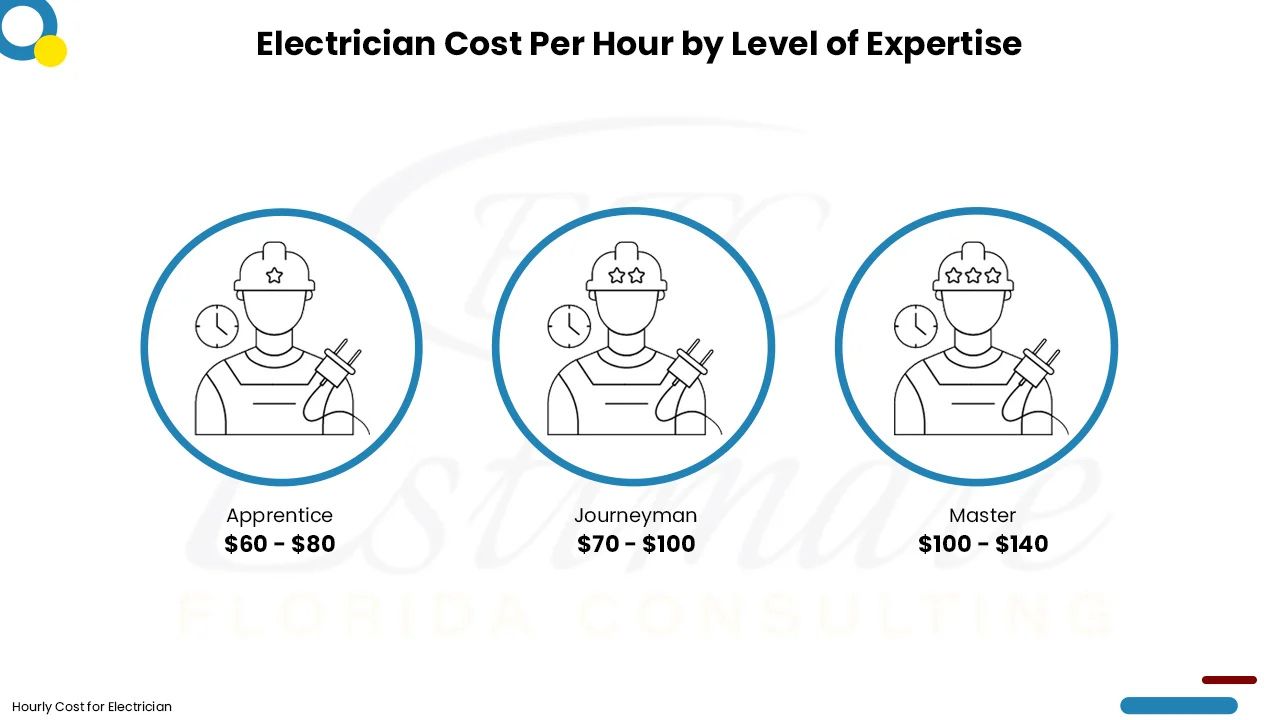
Electrician Grade | Average Hourly Rate |
Apprentice Electrician | $60 – $80 |
Journeyman Electrician | $70 – $100 |
Master Electrician | $100 – $140 |
Light Switch Cost by Type in St. Pete Beach
The cost of light switches ranges from $5 to $55, depending on the type of switch you choose. While picking a light switch may seem simple, there are several options to consider based on your needs.
For basic functionality, toggle switches are a reliable and budget-friendly choice. If you’re looking to create a specific mood or adjust lighting levels, dimmer switches are a great option, though they cost a bit more due to their added features. At the higher end of the price range, smart switches offer advanced control, making them perfect for those who want to manage their lighting remotely or integrate it with a smart home system.
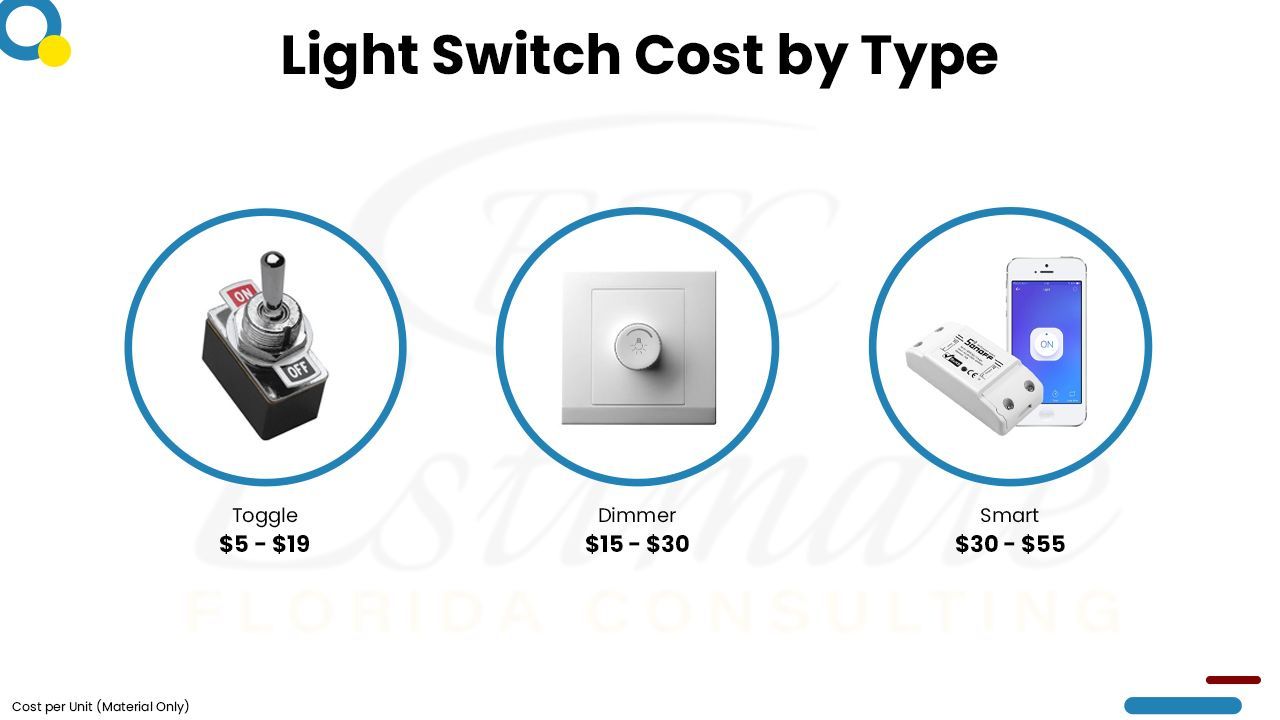
Here’s a breakdown of the average costs by type:
Switch Type | Cost per Unit (Material Only) |
Toggle | $5 – $19 |
Dimmer | $15 – $30 |
Smart | $30 – $55 |
Get Acquainted with Estimation
Maximize Profits: Budgeting Hacks for Big Construction Projects
Save $300K on Your Next Construction Project
Electrical Outlet Prices by Type in St. Pete Beach
Electrical outlets come in many types, each designed for specific needs and appliances. Prices typically range from $1 to $80, depending on the type and features. Choosing the wrong type of outlet can cause serious issues, such as appliance damage, fire hazards, or voided warranties. Some outlets also have different prong configurations, so it’s important to match them with the plugs of your devices.
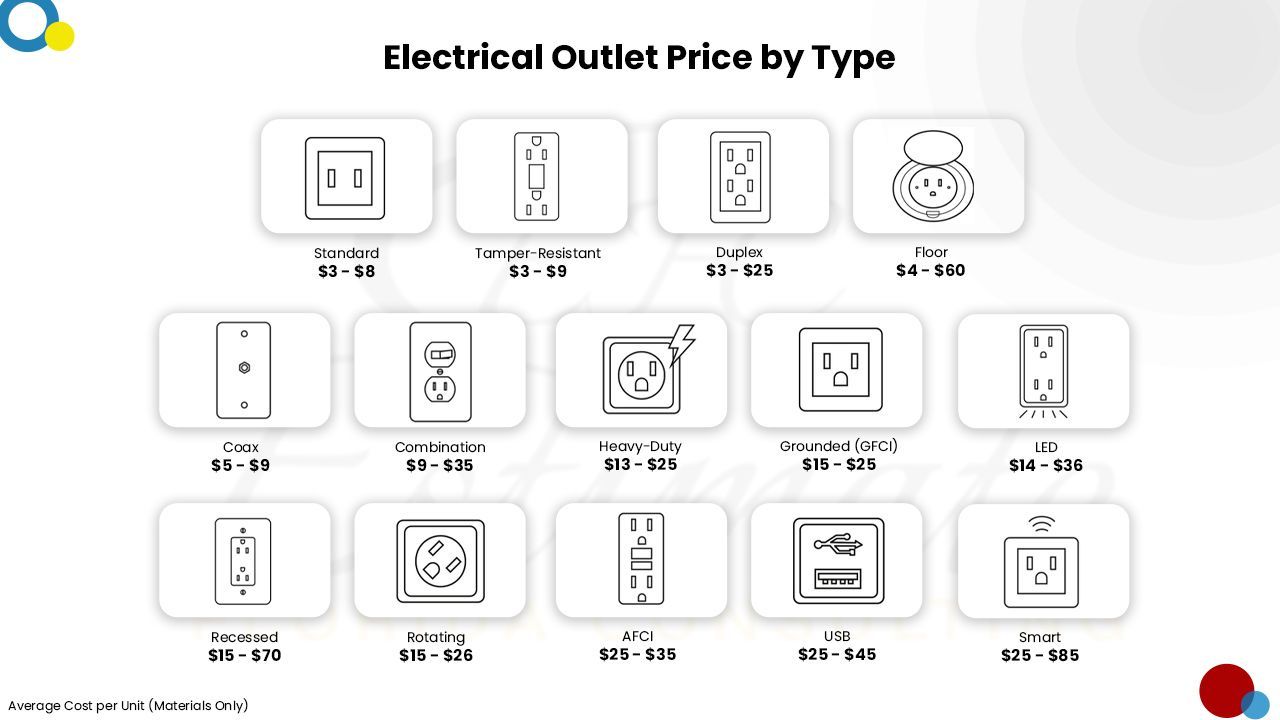
Here’s a list of common outlet types and their average material costs:
Type | Average Cost (Materials Only) |
Standard | $3 – $8 |
Tamper-Resistant | $3 – $9 |
Duplex | $3 – $25 |
Floor | $4 – $60 |
Coax | $5 – $9 |
Combination | $9 – $35 |
Heavy-Duty | $13 – $25 |
Grounded (GFCI) | $15 – $25 |
LED | $14 – $36 |
Recessed | $15 – $70 |
Rotating | $15 – $26 |
AFCI | $25 – $35 |
USB | $25 – $45 |
Smart | $25 – $85 |
Cost to Upgrade an Electrical Panel in St. Pete Beach
Many older homes have electrical panels that struggle to meet modern energy needs. If you notice flickering lights or your new appliances aren’t performing as they should, it could be a sign that your panel is too small and needs an upgrade. Upgrading from an 80- or 100-amp panel to a 150-amp panel provides room for additional power usage. Moving to a 200-amp panel is even better for supporting larger appliances, home additions, or a garage without overloading your system.
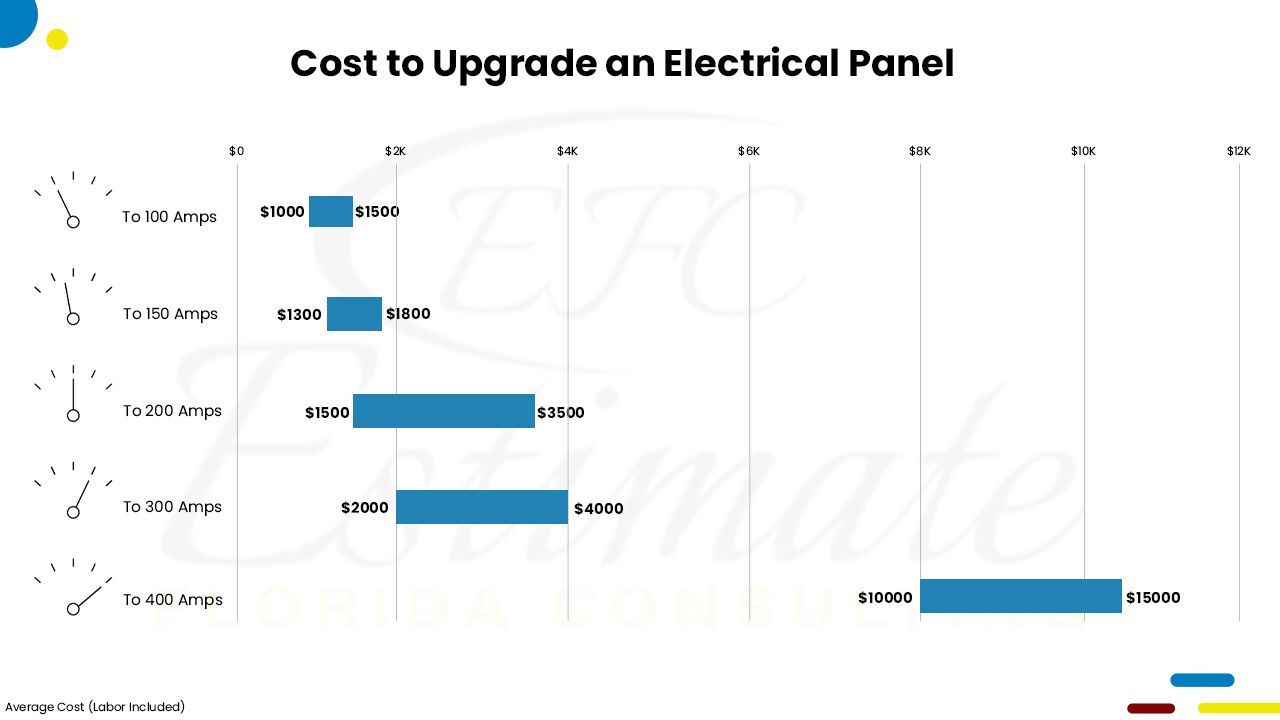
Here’s an idea of what it might cost to upgrade your electrical panel:
Upgrade | Average Cost (Including Labor) |
To 100 Amps | $1,100 – $1,650 |
To 150 Amps | $1,430 – $1,980 |
To 200 Amps | $1,650 – $3,850 |
To 300 Amps | $2,200 – $4,400 |
To 400 Amps | $11,000 – $16,500 |
Ready for reliable electrical installation? Get a fast estimate today!
Electrical Costs by Building Complexity in St. Pete Beach
Single-Story Homes
Wiring a single-story home is usually straightforward, with fewer vertical runs and a simpler overall layout compared to larger or more complex structures. The cost for electrical work in single-story homes generally falls between $4 and $7 per square foot, influenced by the number of circuits, the types of light fixtures, and the quality of components chosen. Homes with basic needs, like standard outlets and fixtures, will fall on the lower end of the spectrum, while those incorporating modern features like smart home systems or high-efficiency LED lighting may see slightly higher costs. Additional factors, such as local labor rates and regional code requirements, can also affect the final expense.
Multi-Story Residential Buildings
Electrical work for multi-story homes, condominiums, or townhouses involves more intricate planning and installation compared to single-story homes. Vertical wiring, additional distribution panels, and careful placement of conduits for seamless power flow between floors increase the complexity. Costs for these projects range between $5 and $9 per square foot, with the inclusion of features like smart lighting systems, elevators, or energy-efficient solutions pushing the cost even higher. The planning phase is critical in these buildings to ensure compliance with local safety codes and to account for future scalability, making skilled electricians essential for such projects.
Multi-Unit Apartments and Condominiums
Multi-unit dwellings like apartments and condominiums demand extensive coordination to ensure each unit has its dedicated power supply while adhering to building-wide electrical codes. Load calculations must be precise, and metering for individual units must be integrated seamlessly. Electrical costs typically range from $6 to $10 per square foot, depending on the building’s complexity. Shared areas, such as hallways, lobbies, and parking garages, require additional considerations for lighting, emergency systems, and safety features like fire alarms. High-quality lighting for common areas and advanced systems like keycard-controlled access or security cameras can add significant costs.
Electrical System Components and Their Costs
Panels, Breakers, and Distribution Boards
Main panels and sub-panels are crucial for distributing electricity throughout a building. A standard panel can cost between $1,500 and $5,000, with price variations depending on capacity, brand, and specific features like surge protection or energy monitoring capabilities. Larger homes or buildings may require multiple panels to accommodate higher electrical loads, increasing costs further. Advanced panels with smart features, such as load balancing or remote access via mobile apps, can also add to the expense but provide enhanced convenience and energy efficiency.
Wiring and Cabling
The cost of wiring is heavily influenced by the type of material used and the complexity of the installation. For instance, copper wiring is more expensive than aluminum but offers superior conductivity and durability. A typical single-family home might spend $2,000 to $10,000 on wiring, depending on the layout and specific electrical needs. Commercial or larger-scale residential projects often require specialty cables, such as those designed for high-voltage systems or weather resistance, which can push the cost even higher. Properly installed wiring is essential for both safety and performance, making it a critical component of any electrical system.
Lighting Fixtures and Controls
Lighting costs vary widely based on the style, type, and control system used. Basic lighting packages for a small home can start at $1,000 to $3,000, while homes or buildings opting for custom fixtures, recessed LEDs, or advanced lighting controls can spend $5,000 to $15,000 or more. High-end systems may include features like dimming, color-changing LEDs, or integration with smart home platforms, adding convenience and aesthetic value but also raising the price. Commercial spaces often require robust lighting solutions for safety and functionality, further increasing costs.
Outlets, Switches, and Receptacles
While individual outlets and switches are relatively affordable at $2 to $5 per unit, the overall number required can add up quickly, especially in larger homes or multi-unit buildings. For a medium-sized home, total costs can range from $1,000 to $3,000, depending on the number of rooms and specific electrical needs. Specialty outlets, such as USB-integrated or tamper-resistant ones, may cost more but provide additional functionality and safety. Proper placement of outlets and switches is key to ensuring a home’s electrical system is both functional and convenient.
Backup Power Systems and Generators
Backup power systems are increasingly popular in areas prone to power outages or extreme weather conditions. A basic backup generator can cost around $3,000, while larger or more advanced systems designed to power an entire home or building can exceed $10,000. Fuel type—such as gas, propane, or solar—also plays a role in determining costs. Many homeowners and businesses consider these systems essential for ensuring continuity and protecting sensitive electronics during outages. Advanced setups may include automatic transfer switches and noise reduction features, further increasing the price but offering significant peace of mind.
Factors Influencing Electrical Costs
Scope of the Electrical Project
The size and complexity of an electrical project play a major role in determining the overall cost. For instance, adding a few circuits to a small home renovation is far less expensive than installing an entire electrical infrastructure in a multi-story commercial building. Elements like the number of circuits, fixtures, and specialized systems—such as security or automation—are key cost drivers. A simple residential project might require basic wiring and outlets, while a large-scale commercial installation might involve high-capacity systems, advanced safety features, and future-proofing considerations.
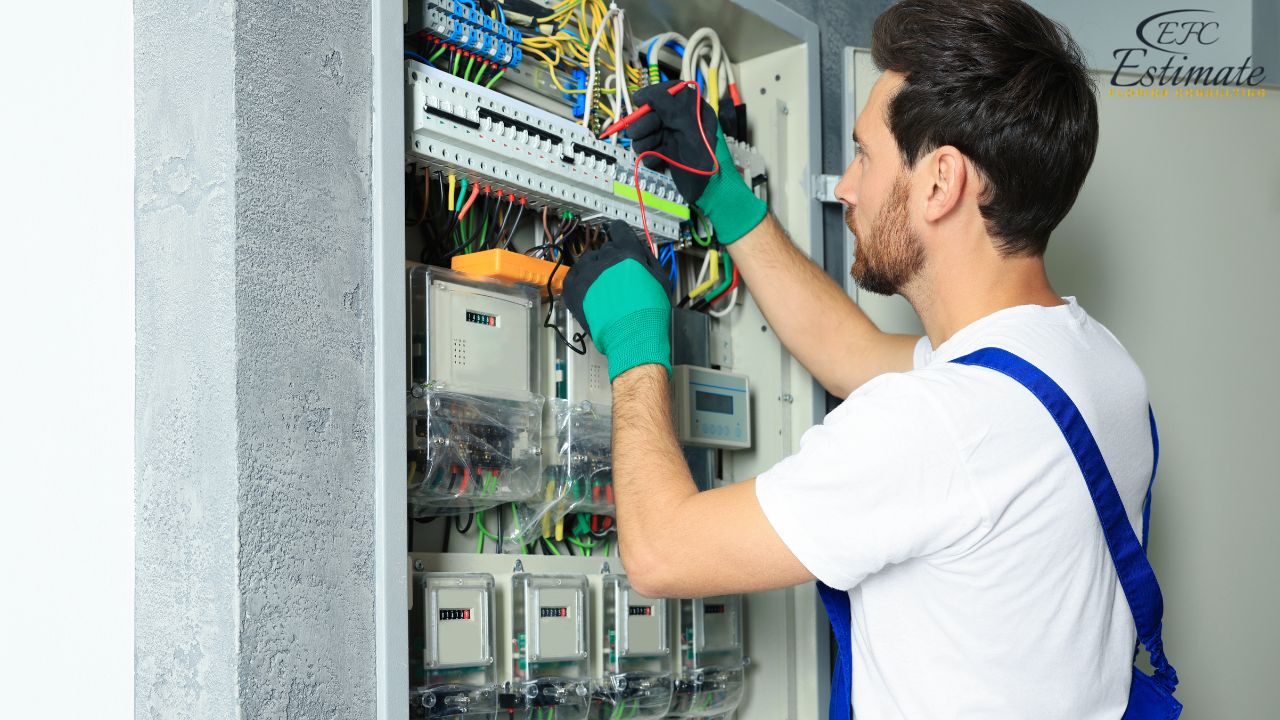
Materials and Equipment Quality
The choice of materials and equipment affects both the upfront cost and long-term performance of an electrical system. Investing in high-quality, durable materials can increase initial expenses but often saves money on repairs and replacements later. In St. Pete Beach, where humidity and salt air pose unique challenges, selecting corrosion-resistant wiring, robust fixtures, and premium electrical panels is particularly important. These materials not only withstand the local climate but also enhance the safety and longevity of the system, making them a worthwhile investment for both residential and commercial properties.
Labor Rates and Skill Level
Labor costs are a significant portion of any electrical project, and they vary depending on the contractor’s expertise, certifications, and the complexity of the work. In St. Pete Beach, hiring a licensed, insured, and experienced electrician may come with higher hourly rates, but the benefits are substantial. Skilled professionals are more likely to complete the job efficiently, reduce the risk of costly mistakes, and ensure compliance with local regulations. This not only saves money in the long run but also provides peace of mind knowing that the work is done safely and to code.
Code Compliance and Permits
Adhering to the Florida Building Code and St. Pete Beach’s specific regulations is essential for any electrical project. Compliance ensures the system operates safely and legally, avoiding potential fines or legal issues. The cost of permits and inspections typically ranges from $100 to $600, depending on the project’s size and complexity. Skipping this step can lead to expensive rework or delays if the project fails an inspection. Ensuring that the electrical installation meets code requirements from the outset is a critical part of cost management and project planning.
Energy-Efficient and Smart Home Systems
Adding energy-efficient and smart home systems can impact upfront costs, but they often provide long-term savings. Features like LED lighting, programmable thermostats, or smart outlets may slightly increase installation expenses. However, these systems reduce energy consumption, lower utility bills, and can even increase property value. In St. Pete Beach, many homeowners and developers are also integrating solar panels, smart home automation, and EV charging stations into their designs, further influencing costs. These upgrades not only align with modern sustainability goals but also cater to growing consumer demand for energy-conscious solutions.
Residential Electrical Systems in St. Pete Beach
Electrical work in residential properties can vary widely depending on the type of home, its size, and the scope of the project. Single-family homes might require basic wiring, breaker panels, outlets, switches, and lighting installations. Luxury oceanfront condos, on the other hand, often demand high-end fixtures, automation systems, and specialized equipment like EV charging stations. In St. Pete Beach, residential electrical costs typically range from $3,000 to $15,000 for moderate renovations and $15,000 to $50,000 or more for new construction or major upgrades. Additional features, such as energy-efficient systems or custom lighting designs, can increase these figures further.
Commercial Electrical Installations in St. Pete Beach
Commercial electrical installations are typically more intricate and demand higher investments than residential projects. These systems often include three-phase power setups, advanced lighting controls, backup generators, and network cabling for communication systems. The cost of commercial electrical work in St. Pete Beach usually ranges from $20,000 to $200,000 or more, depending on the building’s size and electrical requirements. Key considerations include ensuring compliance with stringent building codes, incorporating energy efficiency, and planning for future scalability. For businesses, investing in reliable and scalable systems is essential to support operations, enhance safety, and accommodate growth.
Electrical Permits and Inspection Fees
Securing the required permits and scheduling inspections is essential for ensuring that the electrical system complies with local and state codes. In St. Pete. Beach, permit fees typically range from $100 to $600, depending on the size and scope of the project. Inspection fees vary based on the project’s complexity and the number of site visits required. Adhering to these requirements not only ensures the safety and reliability of the electrical system but also helps prevent costly penalties, delays, or the need for rework. These upfront costs, though seemingly small, play a crucial role in maintaining safety standards and legal compliance for any construction or renovation project.
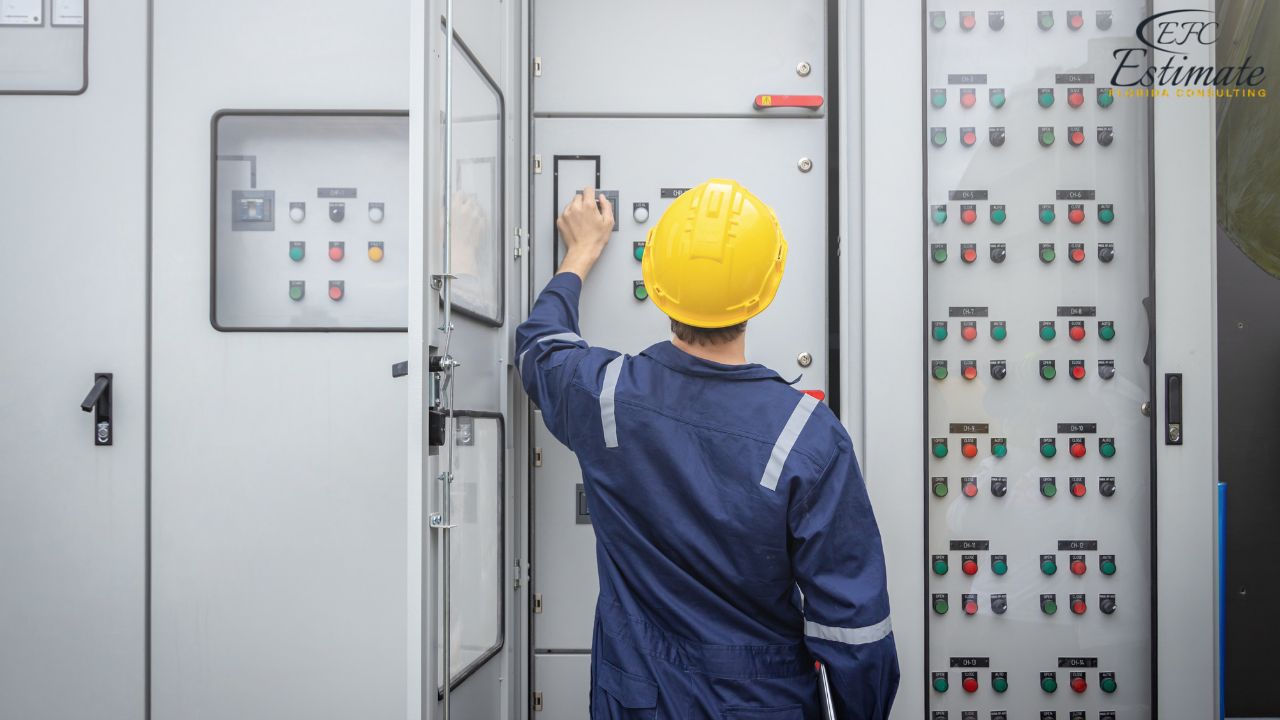
Estimating Electrical Costs: Tips and Tools
Accurate electrical cost estimates are crucial for effective budgeting. To achieve precision, consider the following:
- Detailed Plans: Ensure you provide comprehensive blueprints and electrical schematics to the estimator. Clear documentation minimizes guesswork and helps identify the exact materials and labor needed.
- Material Specifications: Decide on the brands, quality levels, and types of fixtures early in the planning process. This helps avoid last-minute changes that could disrupt timelines and inflate costs.
- Multiple Bids: Gather quotes from several contractors to compare pricing and ensure you’re getting competitive rates. Evaluating bids also gives insight into the scope of work and potential cost-saving alternatives.
- Professional Estimators: Use tools, software, and expert guidance to validate and refine your estimates. Collaborating with companies like Estimate Florida Consulting adds reliability and accuracy, ensuring all project aspects are accounted for.
Investing time in these steps provides clarity and helps avoid surprises down the line, keeping the project within budget and on schedule.
Why Choose Estimate Florida Consulting for Electrical Cost Estimation?
We understand that contractors and builders in St. Pete Beach often face tight deadlines and budget constraints. That’s why our team focuses on providing precise and comprehensive electrical cost estimates that help contractors avoid costly overruns. With a proven track record and expertise in Florida’s construction industry, we are the go-to partner for electrical estimation services. Unlike others who might focus on teaching the process of estimation, we take on the responsibility of delivering actionable and ready-to-use estimates.
Benefits of Hiring a Professional Electrical Cost Estimator
Engaging a professional electrical cost estimator offers significant advantages, especially for contractors and developers in St. Pete Beach. Here’s why working with an expert can make a difference:
Accurate Budgeting
One of the biggest benefits of professional cost estimation is accurate budgeting. A professional estimator provides detailed and precise projections, helping you avoid surprise expenses or hidden costs. This ensures you have a clear financial roadmap, allowing for better planning and allocation of resources.
Time Savings
Managing a construction project involves juggling many responsibilities. By hiring a professional estimator, you can save valuable time and focus on other critical aspects of your project. The estimator takes care of the complex calculations, freeing you to prioritize tasks like managing teams or securing permits.
Reduced Financial Risk
Overspending or underbudgeting can derail a project. Professional estimators mitigate these risks by delivering thorough, well-researched cost breakdowns. With their expertise, you can stay on track financially, avoiding costly mistakes and ensuring your project remains profitable.
Better Decision-Making
Having accurate cost estimates enables you to make smarter decisions. From choosing materials and allocating labor to setting realistic project timelines, professional estimates give you the clarity needed to optimize every aspect of your construction process. With the right data in hand, you can streamline operations and achieve your project goals more efficiently.Wiring a single-story home is usually straightforward, with fewer vertical runs and a simpler overall layout compared to larger or more complex structures. The cost for electrical work in single-story homes generally falls between $4 and $7 per square foot, influenced by the number of circuits, the types of light fixtures, and the quality of components chosen. Homes with basic needs, like standard outlets and fixtures, will fall on the lower end of the spectrum, while those incorporating modern features like smart home systems or high-efficiency LED lighting may see slightly higher costs. Additional factors, such as local labor rates and regional code requirements, can also affect the final expense.
Download Template For Electrical Project Breakdown
- Materials list updated to the zip code
- Fast delivery
- Data base of general contractors and sub-contractors
- Local estimators

Working with an Electrical Cost Estimator
Partnering with a professional electrical cost estimator in St. Pete Beach offers numerous advantages for contractors, homeowners, and developers. Estimators are well-versed in local regulations, labor costs, and material availability, enabling them to deliver accurate and realistic cost projections. Their expertise allows stakeholders to navigate complex electrical projects while staying within budget.
Professional estimators also help identify potential cost-saving opportunities, such as alternative materials or efficient labor practices, without compromising quality. Engaging an estimator early in the planning phase ensures a smooth process, fosters transparency, and reduces the likelihood of unexpected expenses. Their insights and recommendations streamline the construction workflow, making them an invaluable resource for any project.
How We Support Contractors in St. Pete Beach?
We understand that being a contractor can be tough, especially when you’re juggling multiple projects at once. That’s why we offer electrical cost estimation services designed to simplify your work and keep your projects running smoothly. Here’s how we collaborate with contractors like you:
Professional estimators also help identify potential cost-saving opportunities, such as alternative materials or efficient labor practices, without compromising quality. Engaging an estimator early in the planning phase ensures a smooth process, fosters transparency, and reduces the likelihood of unexpected expenses. Their insights and recommendations streamline the construction workflow, making them an invaluable resource for any project.
Understanding Your Project
We start by discussing your project in detail. Whether you’re working on a commercial building, a residential project, or a custom design, we take the time to fully understand the scope, goals, and specific needs of your job.
Gathering Essential Information
Our team collects all the critical details required for an accurate estimate. This includes reviewing architectural plans, material specifications, and ensuring compliance with St. Pete Beach’s local regulations. We leave no stone unturned to make sure the numbers are right.
Creating Detailed Estimates
With the help of advanced tools and years of industry experience, we generate precise, detailed cost estimates. We consider everything from labor costs to materials and potential unexpected expenses, so you can budget confidently and avoid surprises down the line.
Delivering on Time
We understand that delays can derail a project, so we prioritize delivering your cost estimates promptly. This ensures you have the information you need to meet deadlines and keep your projects on schedule.
Conclusion
Electrical cost estimation is a critical step in ensuring the success of any construction or renovation project in St. Pete Beach. By understanding the factors that influence expenses, engaging with experienced professionals, and leveraging accurate data, stakeholders can make informed decisions that lead to efficient, compliant, and cost-effective electrical installations. At Estimate Florida Consulting, we specialize in providing precise estimates tailored to your project’s unique requirements, ensuring your investments in electrical infrastructure yield long-term benefits.
Question Answer
Frequently Asked Question
To ensure precise electrical cost estimation, follow these essential steps:
- Choose the Right Projects – Focus on jobs that align with your expertise and resources.
- Review Job Specifications – Carefully examine the project requirements, codes, and client expectations.
- Analyze Electrical Drawings – Study blueprints to determine the scope of work and potential challenges.
- Perform a Material Takeoff – List all required materials, including wiring, outlets, panels, and fixtures.
- Calculate Labor Costs – Estimate labor hours based on task complexity and workforce efficiency.
- Account for Overhead Expenses – Factor in business costs such as insurance, permits, and equipment.
- Determine Profit Margin – Apply a markup to cover profit and unforeseen expenses.
Residential vs. Commercial Electrical Estimation
- Residential Electrical Work: Typically involves smaller-scale projects with standardized materials and labor rates.
- Commercial Electrical Work: Requires complex systems, higher voltage installations, and additional compliance considerations, often leading to higher costs and extended timelines.
Electricians are licensed professionals with a clear understanding of job costs and time requirements. Since their work involves specialized skills and safety risks, there is usually little room for negotiation. However, you may be able to discuss pricing options, service bundles, or alternative solutions to better fit your budget.
To determine the labor cost for electrical work, follow these steps:
Calculation Steps:
- Determine the Hourly Labor Rate – Electricians typically charge between $50 and $150 per hour.
- Estimate Required Labor Hours – The total hours depend on the project's size and complexity.
- Multiply Rate by Hours – Multiply the hourly rate by the estimated hours to calculate total labor cost.
Additional Considerations:
- For new construction projects, consider offering a flat fee upfront.
- Account for extra time in case of unexpected complications.
- Using subcontractors may increase costs but can reduce overhead since they often bring their own tools and equipment.
Related Information:
- Electrical material costs should also be estimated separately.
- To calculate electricity costs:
- Watts = Amps × Volts
- Kilowatt-hours = Watts × Usage ÷ 1000
- Cost = Kilowatt-hours × Electricity Rate
Electricians earn high wages due to several factors:
- High Demand – In busy metropolitan areas, electrical work is consistently in demand, driving up wages.
- Complexity of Work – Large-scale and intricate electrical projects require advanced skills and expertise.
- Safety Risks – Electrical work involves significant hazards, justifying higher pay for trained professionals.
- Licensing & Training – Electricians undergo extensive education, apprenticeships, and certification processes, adding value to their expertise.
- Specialization – Certain fields, such as industrial or commercial electrical work, require specialized knowledge, leading to even higher earnings.
Follow these steps to prepare an accurate electrical bid for your home project:
- Review the Specifications – Understand project requirements, materials, and local electrical codes.
- Analyze the Drawings – Study blueprints to identify wiring layouts, panel locations, and fixture placements.
- Perform a Quantity Takeoff – List all necessary materials, including wiring, outlets, switches, and circuit breakers.
- Calculate Labor Costs – Estimate labor hours and multiply by the electrician’s hourly rate.
- Factor in Overhead Costs & Profit – Include business expenses, permits, and a markup for profit.
- Create Your Electrical Estimate – Compile material, labor, and overhead costs into a detailed estimate.
- Double-Check & Submit Your Proposal – Review for accuracy before submitting your bid.
Accurate bidding ensures competitive pricing while covering costs and maintaining profitability.
If you believe a contractor's price is too high, approach the conversation politely and strategically:
Be Reasonable and Tactful:
- Express that the estimate is beyond your budget and ask if there are ways to reduce costs.
- Request a detailed breakdown of the estimate to understand where the expenses come from.
- Compare pricing and quality with other contractors to ensure fairness.
- Explore cost-saving options such as bulk discounts or long-term agreements.
Negotiate Effectively:
- Discuss possible adjustments to the project that could lower the price.
- Consider alternative materials or methods that may be more budget-friendly.
- Keep the conversation open until you reach a fair and reasonable agreement.
Seek Legal Advice if Necessary:
- If the amount in question is significant, consulting an attorney may be a good option.
- If you suspect overcharging, an expert review of the invoice can help clarify costs.
Maintaining open and respectful communication can lead to a better deal without compromising quality.
Comprehensive Trade-Specific Estimates
At Estimate Florida Consulting, we offer detailed cost estimates across all major trades, ensuring no part of your project is overlooked. From the foundation to the finishing touches, our trade-specific estimates provide you with a complete and accurate breakdown of costs for any type of construction project.

Testimonials
What Our Clients Say
We take pride in delivering accurate, timely, and reliable estimates that help contractors and builders win more projects. Our clients consistently praise our attention to detail, fast turnaround times, and the positive impact our estimates have on their businesses.
Estimate Florida Consulting has helped us win more bids with their fast and accurate estimates. We trust them for every project!

Steps to Follow
Our Simple Process to Get Your Estimate
01
Upload Plans
Submit your project plans, blueprints, or relevant documents through our online form or via email.
02
Receive Quotation
We’ll review your project details and send you a quote based on your scope and requirements.
03
Confirmation
Confirm the details and finalize any adjustments to ensure the estimate meets your project needs.
04
Get Estimate
Receive your detailed, trade-specific estimate within 1-2 business days, ready for your project execution.





